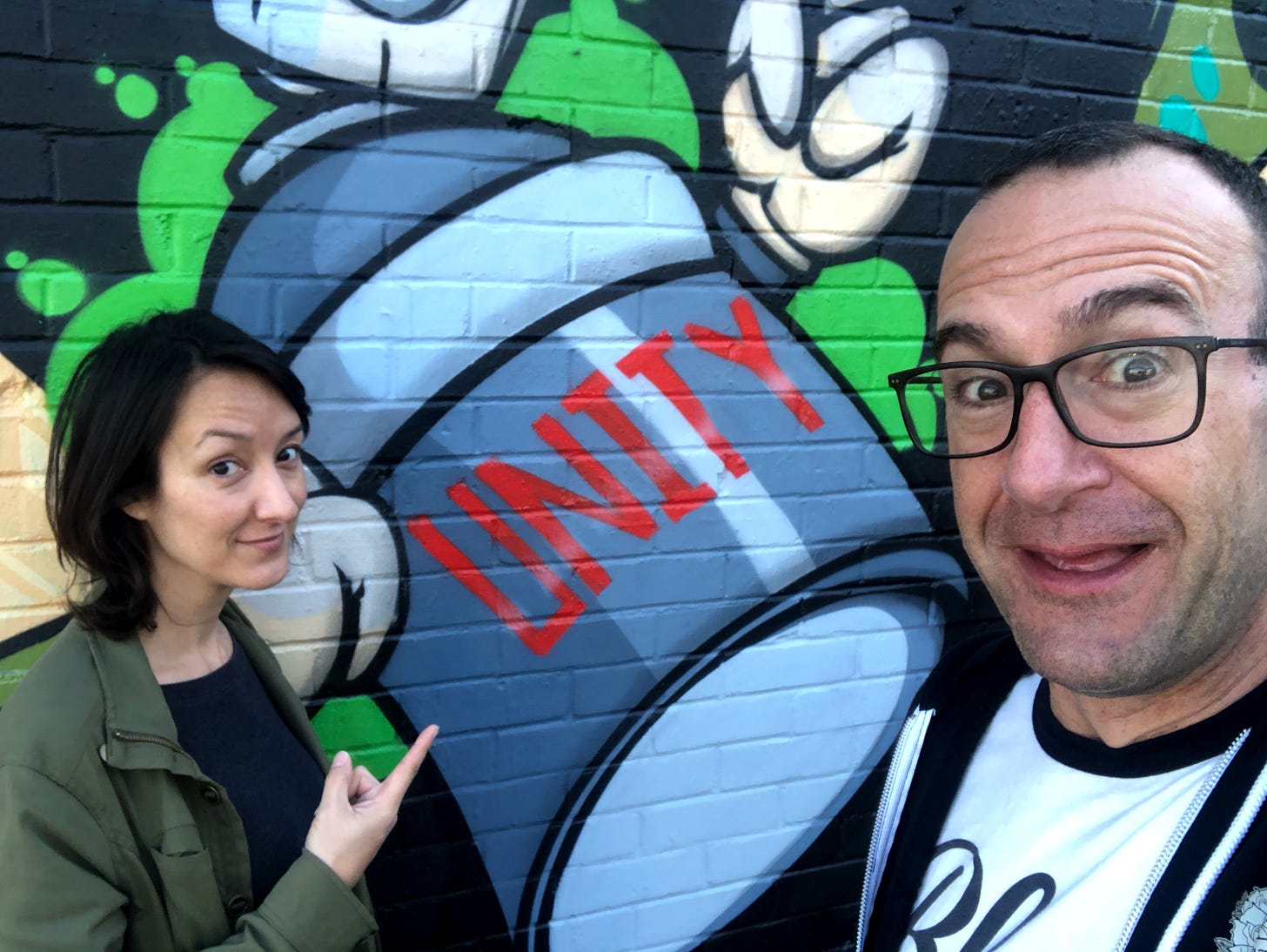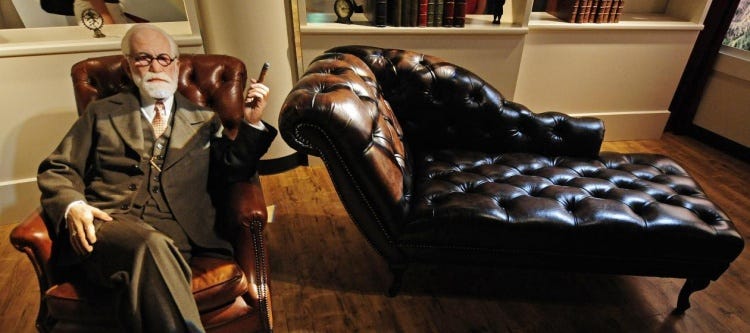Welcome to The Experiment, where things get a little smelly when you peel back layers to the onion. Jack Hughes marks the anniversary of his prediction that the Rock would run for president… by noting the Rock is talking about running for president. And Robin Whetstone’s therapist might be an idiot.
And of course we have recommendations on what to do (shutting off notifications), read (Dan Zak on Andrew Cuomo), watch (Derek DelGaudio's stunning In & Of Itself), and listen to (Dayglow’s “Woah Man”).
But first, have you heard what San Francisco has done now?
San Francisco has cancelled Lincoln because he was a white supremacist, or at least that’s what my walking buddy told me when we started off around the lake a couple months back. That’s how we start our walks, with him telling me about the latest outrage in the world before we get into our groove and dig into real things. His ire is equal opportunity; he has no patience for scolds or morons of any ideological tribe, but given his profession—he’s a writer—seeing a historical figure become a non-person shakes the foundation he’s built a career upon. But the truth is that the lake we walked around is just a damned-up lake, and the story about San Francisco cancelling Lincoln is wrong.
But it’s a funny story. Want to hear it? Because it’s not really a story about political correctness as it is about how good intentions are lousy road materials.
California has been slow to reopen public schools to in-class instruction. Texas reopened classrooms at the beginning of the 2020-21 school year. California girls and boys only went back this month. So when the San Francisco school board met in January, you might expect their focus to be on that. Instead, they demanded unanimously that 44 schools be renamed by April, which is a little like pausing Dunkirk to rename the boats.
The list of schools slated for redesignation were Alamo Elementary and Revere Elementary, the former because it bore the name of the Anglo Texians’ land grab of northern Mexico and the latter because of Paul Revere’s participation in the 1779 Penobscot Expedition which similarly took land from the Penobscot people of Maine. That’s all fine, except for the the fact that Alamo Elementary’s name was taken from the Spanish word for poplar tree and Revere was battling the British, who had already taken the tribal land.
If this sounds like a lazy student cribbed research from Wikipedia, not quite. It was lazy adults who consulted Wikipedia. Really.
And it gets worse from there. Really.
Also slated for renaming was Feinstein Elementary, the California political icon who started on the San Francisco city council. Her sin dates to 1984 when as mayor there was a permanent display of flags outside city hall that included the Confederate flag. When it was torn down, someone replaced it, which the 2021 school board blamed on Feinstein. When the Confederate flag was vandalized a second time, it was not replaced, which the 2021 school board did not credit to Feinstein.
If this sounds like a lazy student cribbed research from Wikipedia, not quite. It was lazy adults who consulted Wikipedia.
All of that was fodder for local grist. All the national media cared about was the whole “San Francisco cancels Lincoln” bit, and for good reason. There’s no question that Abe Lincoln was probably a white supremacist by our modern standards even if he did free the slaves. And I’d even entertain an argument that we should not hold up someone who held white supremacist views—OK, I’ll say it, a racist—as a racial justice icon even if the textbooks inside the schoolhouse teach that Lincoln—again, cannot emphasize this enough—freed the slaves.
But that was not at all why San Francisco initially demanded a new name for Abraham Lincoln High School. His sin was allowing the execution of 38 Santee Sioux found guilty of raping and killing settlers. Maybe they just skimmed Wikipedia, because ignored in San Francisco’s historical analysis was Lincoln’s commutation of more than 250 sentences of other Sioux warriors sentenced to be hanged.
They were just talking about names on buildings and not books in libraries. The Board of Education did not demand students receive a political re-education of Lincoln as a bad guy. He wasn’t getting cancelled in any real sense of the word. All the board did was require that Lincoln High and 40-odd other schools change their names by April. To imagine that the name on a building would change Lincoln’s standing in history is absurd. I actually attended a Lincoln Elementary when I lived in San Francisco in the ‘70s. That school has since closed with little effect on the esteem in which we hold the Great Emancipator.
The national press did not lead with nuance.
“San Francisco’s Ridiculous Renaming Spree,” was The Atlantic’s headline.
“San Francisco Schools Cancel Lincoln,” blared the conservative Daily Signal.
“San Francisco School Board Dances Atop Lincoln’s Grave,” wrote Newsweek.
The story fit neatly into the narrative of censorious leftists run amok down a slippery slope. First they came for the Confederate statues, and I did nothing because what else you gonna do, and then they came for Chris Pratt and I did nothing because we had plenty of Chrises remaining, and better ones at that. We told you if they took down Confederate markers then next thing you’d know they’d be cancelling George Washington and Thomas Jefferson because they enslaved people—which as it turns out is exactly what happened. (The San Francisco Board of Education also voted to rename schools named after slave owners.)
“San Francisco School Board Dances Atop Lincoln’s Grave”
But what not even the most conservative hysterics saw coming was Lincoln getting cancelled because he didn’t pardon enough Sioux. This was the worst possible caricature of the woke left that well-meaning liberals like me insisted would never happen. In fact, last August I wrote that applying the slippery slope argument to removing Confederate statuary was “a terrific example of how something can be perfectly logical and make no sense at the same time, because it is perfectly within a person or a government’s ability to apply values to similar situations and make different choices based on their best judgment.”
It appears I was wrong.
But was I? Was I, really?
Reader, I was not.
It’s takes a special kind a smart for the San Francisco Board of Education to do something this dumb. I mean, a city smart enough to write building codes capable of withstanding earthquakes doesn’t accidentally come up with a mess unable to survive a simple Google search. Doing something this dumb required a committee of concerned citizens.
After the violence in Charlottesville in 2017, the SF Board of Education appointed a committee of regular-ass people to identify schools named for people who “engaged in the subjugation and enslavement of human beings; or who oppressed women, inhibiting societal progress; or whose actions led to genocide; or who otherwise significantly diminished the opportunities of those amongst us to the right to life, liberty, and the pursuit of happiness.”
That description covers a lot of road. Enslaving people is pretty simple, and if you want to argue that we should look past certain enslavers such as Washington, I’m open to your argument, but I’m happy to go on record as judging slavery as unequivocally bad. Also engaging in genocide. You can’t “both sides” genocide. The argument that we can’t judge the past by present-day morality never holds as much water for me as seems to for others. To each his own, though.
The downside to local government is that advisory committees get filled with activists, Nextdoor aficionados, and Area Men.
But “inhibiting social progress” is so broad as to be a catch-all for conceivably anyone ever. And if we are going to ban anyone who has significantly diminished the pursuit of happiness, then no one is naming a high school after my mother. There was the curfew, of course, and that one time she grounded me for getting a speeding ticket.
It’s easy to pick on San Francisco—we just did, see?—but this is the near inevitable result of local government. The downside to local government is that advisory committees get filled with activists, Nextdoor aficionados, and Area Men. In other words, amateur loudmouths. Politicians created a charge broad enough to cover their butts and staffed a historical revision committee with people less expert than angry. They followed instructions to their illogical ends, and the Board of Education, perhaps thinking this was an excellent idea, did the worst possible thing. By April Abraham Lincoln had to be thrown into the trash heap of history.
April has come and nearly gone, yet Abraham Lincoln’s name remains on the three-story building built in 1940. Why? Because the Mayor yelled at them that it was stupid to rename schools they had no plans to reopen, which gave the board political cover to backtrack. Schools in California have just now opened to in-class instruction. The renaming project, however, remains on the shelf.
This is the problem with the way these stories play out. Local politicians give bad guidance to well-meaning amateurs who do something that seems to fit into a national narrative. Then, after the media moment has passed, the rest of the process plays out when the grownups gently suggest not doing dumb stuff. Everyone in San Francisco knows this won’t happen. Everyone in the country thinks it did, like my walking buddy, who’s moved onto new outrages.
“Did you hear about Chicago?” he asked recently. “They’re banning Lincoln now, too! Imagine, the Land of Lincoln…”
The Rock is on a Roll
by Jack Hughes
When Jack Hughes wrote a humorous piece about Dwayne “The Rock” Johnson running for president a year ago, he didn’t mean to ‘Beetlejuice’ it into existence. Now it’s no laughing matter.
Certain Features
by Robin Whetstone
Only Robin Whetstone could go to therapy and be told she’s too unyielding on the subject of racism and homophobia. Could being anti-racism be a personality disorder?
How we’re getting though this
Deciding what to stop doing
Creating a culture of listening
Turning off all notifications because science
Using AI to improve treatments within minutes
Learning there is no “creative cliff” (h/t Jack Hughes)
Subscribing to print newspapers for hilarious reasons
What I’m reading
Sonny Burch: “Refusing to cover Armie Hammer turns critics into moralists. That’s not our role.” - This!!
…there’s a difference between considering the morality of a work in question as part of a larger conversation, and reducing the entire value of a work to the morality of the workers making it. As Thomson argues, we seem to be losing the ability to hold two noncontradictory ideas in our head at once.
John Hodgman: “Judge John Hodgman on What Constitutes Time Travel” - I am unswayed by this decision, but we are ruled by laws.
Ann Hornaday: “Scott Rudin’s bad behavior was just another Hollywood cliche until a new generation said time’s up” - If Ann Hornaday writes it, I read it.
…as irritated as I can be when people half my age seem to think work should be organized solely for their comfort and personal expression, I’m impressed by how that cohort — especially women — simply will not tolerate bad behavior that was once considered part of a day’s work. And those standards apply not just to obvious abuse but to the “harmless” but grindingly demoralizing jokes, physical compliments, shoulder-rubs and patronizing put-downs that countless women (and quite a few men) have had to manage on top of getting our work done.
Nathan Robinson: “Surely We Can Do Better Than Elon Musk” - This was the balanced, clear-eyed analysis of Elon Musk I’d been looking for.
It is natural to desire a “fantastic future.” Personally, I’m sad that we no longer have World’s Fairs showcasing what we think humankind might accomplish in the next decades. Musk fandom arises in part because he is offering something resembling a path to clean energy and space exploration, both of which are appealing and important. But it’s a mirage, and following it will take us further in the direction of dystopia. Instead, we need a humanistic vision of a high-tech future, one that rejects workplace tyrants, privatized spacefaring, and ever-multiplying underground freeways in favor of democratic governance, strong public institutions, and transit for the people. It can be done, even in the world of Actual Machines. And it can be more inspiring than anything Elon Musk has ever dreamed of.
Katherine Schultz: “There Is Rampant Distrust in Education. Here’s How to Fix That” - Smart stuff here about regaining trust.
What are the instances where members of the community felt distrust, and what might the district or school do to repair this damage? Consider the truth and reconciliation commission established in South Africa in 1995 to acknowledge past injustices during apartheid. The opportunity to tell stories publicly is one way to acknowledge the past—and move beyond deeply entrenched distrust.
Margaret Sullivan: “By bearing witness — and hitting ‘record’ — 17-year-old Darnella Frazier may have changed the world” - Darnella Frazier is a legit hero.
“The world needed to see what I was seeing,” she said.
We saw it, Darnella.
Dan Zak: “The father, the son and the holy Cuomo mess” - Dan Zak’s pieces are straight literature.
With the son on the brink of a failure more profound than his father’s 1994 reelection loss, those who’ve worked alongside Andrew Cuomo can’t decide what type of tragedy this is.
What I’m watching
The Pop Culture Happy Hour consensus of HBO Max’s new show Made for Love is that it’s a good show, not great.
My walking buddy mentioned above recommended Derek DelGaudio's In & Of Itself on Hulu. What’s it about? “You could see it for what it is, or imagine it for what it could be,” says DelGaudio at one point, but not of the show. “Every secret has a weight to it and you can only carry it for so long,” he says at another point.
DelGaudio is a magician, and he performs magic tricks in the show, but the show is magical for reasons that have nothing to do with tricks.
“The magic is terrific, but it’s his ability to use the magic to deliver an emotional punch that makes his material so exceptional,” said my walking buddy. “Never saw anything like it.”
Never have I. Highly recommended.
What I’m listening to
Realizing last week that I wasn’t listen to new music about broke my heart. This week, not a problem. Lots of new updates to the Spotify playlist.
My Philadelphia cousins have a band called the Pondemics. Here’s a montage of a porch concert they did to celebrate the birthday of my Uncle Ron, who takes a turn on vocals for “Blueberry Hill,” which is too cute for words.
Lucy Dacus has a new single out, “Hot & Heavy,” and that’s never a bad thing.
I’m encouraged by “Spanish Doors,” a single off Liz Phair’s upcoming album Soberish. The track has some of the dark atmospherics of the ‘90s along with a melody with intention.
Whoever was in charge of telling me about Hanni El Khatib, a Los Angeles-based multi-instrumentalist, is in time out. For the rest of us, “ALIVE” off last year’s FLIGHT is a bouncy, optimistic bop.
Last, Dayglow’s new album makes me so happy. Not just because I love the new single, “Woah Man.” Not just because they’re an Austin-based band that is helping put the city on the music map. But because I have a T-shirt from their tour that was supposed to kick off in March 2020. Now they’re selling tickets for their new tour this year behind their brand-new album, Harmony House. Prevented from touring for their last album, Dayglow used the pandemic to record a new album. Nature is healing itself.
What do you think of today's email? I'd love to hear your thoughts, questions and feedback. I might even put ‘em in the newsletter if I don’t steal it outright.
Enjoying this newsletter? Forward to a friend! They can sign up here. Unless of course you were forwarded this email, in which case you should…
Swimsuit season’s coming. Try Noom, and you’ll quickly learn how to change your behavior and relationship with food. This app has changed my life. Click on the blue box to get 20% off. Seriously, this works.
We set up a merch table in the back where you can get T-shirts, coffee mugs, and even tote bags now. Show the world that you’re part of The Experiment.
We’ve also got a tip jar, and I promise to waste every cent you give me on having fun, because writing this newsletter for you is some of the most fun I’ve had.
Forget the Alamo: The Rise and Fall of the American Myth by Bryan Burrough, Chris Tomlinson, and myself comes out June 8 from Penguin Random House. There is no better way to support this book than to pre-order a copy. You’re going to love reading what really happened at the Alamo, why the heroic myth was created, and the real story behind the headlines about how we’re all still fighting about it today.







